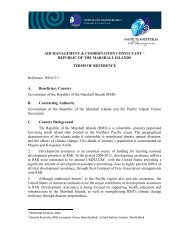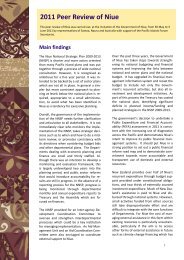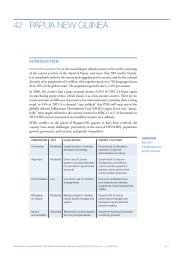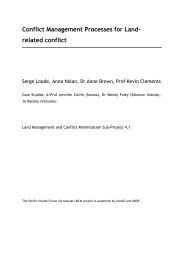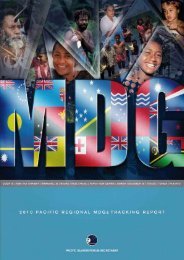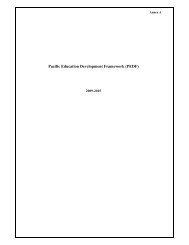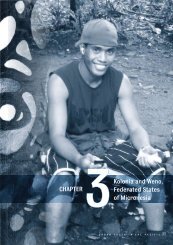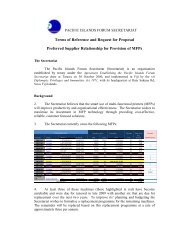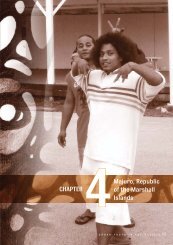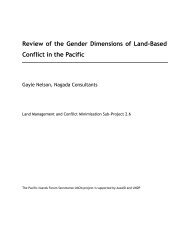Kolonia and Weno, Federated States of Micronesia CHAPTER 3 ...
Kolonia and Weno, Federated States of Micronesia CHAPTER 3 ...
Kolonia and Weno, Federated States of Micronesia CHAPTER 3 ...
You also want an ePaper? Increase the reach of your titles
YUMPU automatically turns print PDFs into web optimized ePapers that Google loves.
36<br />
U R B A N Y O U T H I N T H E P A C I F I C<br />
There is no formal or cultural discrimination against women entering the workforce. The<br />
number <strong>of</strong> women employed in the formal sector almost doubled between 1996 <strong>and</strong> 2000.<br />
On average women’s incomes are 87 percent <strong>of</strong> men’s incomes across all sectors. An equal<br />
number <strong>of</strong> men <strong>and</strong> women are employed in the informal sector. 44 Domestic violence is<br />
believed to be widespread <strong>and</strong> a growing social problem. In 2009, FSM adopted a National<br />
Policy on Disability to increase awareness <strong>and</strong> social inclusion <strong>of</strong> persons with disabilities.<br />
Young people living with disabilities, particularly young women <strong>and</strong> girls who are <strong>of</strong>ten<br />
exposed to greater risks <strong>of</strong> physical <strong>and</strong> sexual exploitation will see this national policy as<br />
supporting their needs. 45<br />
3.3 Young People as Victims <strong>and</strong> Perpetrators<br />
Young people have massive potential to contribute to society <strong>and</strong> this needs to be harnessed<br />
for the benefit <strong>of</strong> national social, economic <strong>and</strong> cultural development. However, young men<br />
<strong>and</strong> women face a range <strong>of</strong> challenges in accessing support <strong>and</strong> services – from government,<br />
their communities <strong>and</strong> at times, their families. Better support <strong>and</strong> services would empower<br />
them to achieve their potential <strong>and</strong> effectively engage in society as productive <strong>and</strong> engaged<br />
community members.<br />
One <strong>of</strong> the most pervasive <strong>and</strong> problematic challenges facing young people is the effect <strong>of</strong><br />
crime <strong>and</strong> violence on their development. Both as perpetrators <strong>of</strong> crimes such as assault,<br />
theft <strong>and</strong> v<strong>and</strong>alism <strong>and</strong> at the same time as victims <strong>of</strong> crime, in particular, violence both<br />
inside <strong>and</strong> outside the home.<br />
Common Crimes<br />
For both Pohnpei <strong>and</strong> Chuuk misdemeanours such as petty theft,<br />
breaking <strong>and</strong> entering, v<strong>and</strong>alism, drunk <strong>and</strong> disorderly behavior<br />
<strong>and</strong> possession <strong>of</strong> illegal substances are the most common crimes<br />
committed by young people according to government sources. The<br />
FSM Census (2000), showed 316 crimes committed by juveniles<br />
aged 17 years or younger, unfortunately this was not disaggregated<br />
by sex. 46 Justice <strong>of</strong>ficials stated that most thefts were for cash to<br />
obtain alcohol <strong>and</strong>/or other substances <strong>and</strong>/or luxury items such<br />
as electronics. Usually the young <strong>of</strong>fender was under the influence <strong>of</strong><br />
alcohol when arrested.<br />
During consultations participants expressed that <strong>Weno</strong> (Chuuk) was regarded<br />
as having greater challenges than <strong>Kolonia</strong> (Pohnpei) in terms <strong>of</strong> young people <strong>and</strong><br />
their involvement with crime <strong>and</strong>/or violence. However, limited statistics around<br />
crimes committed <strong>and</strong> prosecuted makes it difficult to quantitatively determine<br />
which <strong>of</strong> the states has higher challenges with young people <strong>and</strong> their involvement<br />
in crime <strong>and</strong> violence.<br />
Assaults<br />
During consultations participants, particularly young people, reported their awareness <strong>of</strong><br />
assaults committed by <strong>and</strong> against young people. Assaults varied in their degree <strong>of</strong> physical<br />
harm <strong>and</strong> young people generally did not consider pinching, slapping, verbal threats,<br />
pushing/pulling as assault. On the other h<strong>and</strong>, punching, kicking, stomping, <strong>and</strong> using a<br />
44 Government <strong>of</strong> the FSM 2004.<br />
45 HSA 2006.<br />
46 SBOC 2001.



